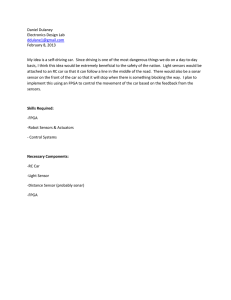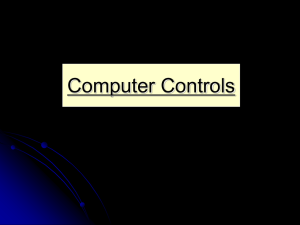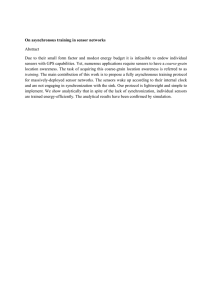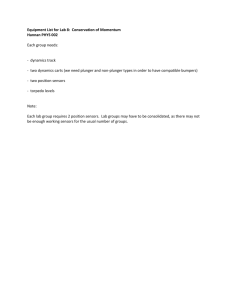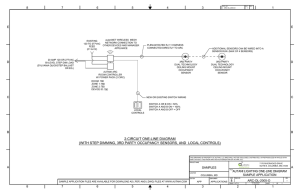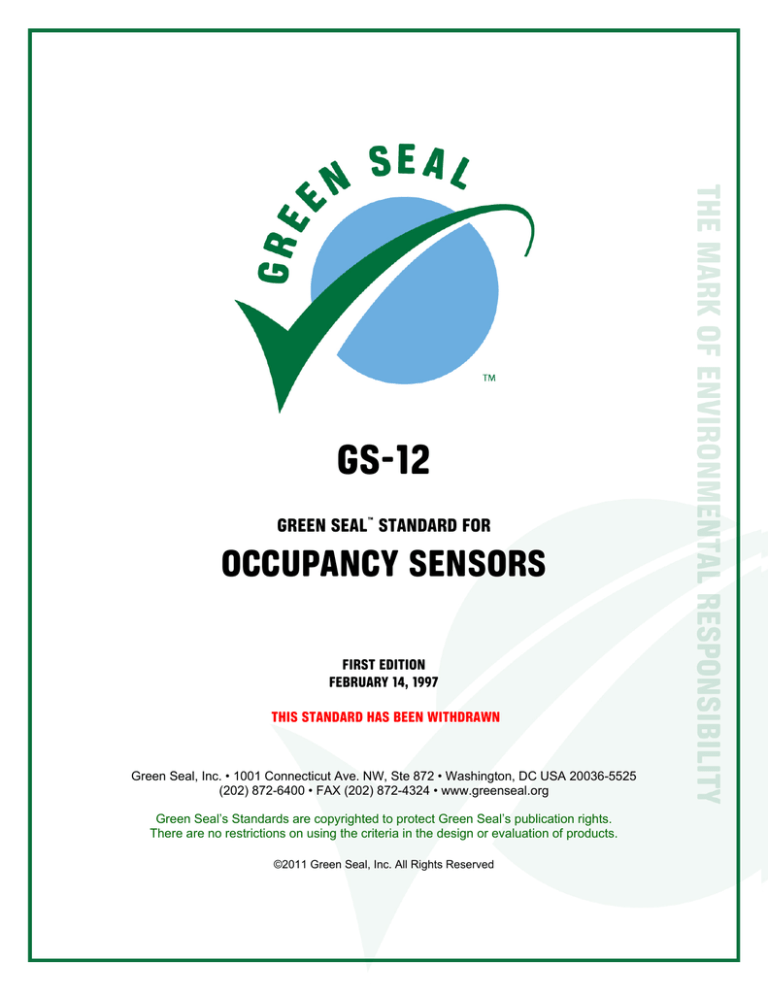
GS-12
GREEN SEAL™ STANDARD FOR
OCCUPANCY SENSORS
FIRST EDITION
FEBRUARY 14, 1997
THIS STANDARD HAS BEEN WITHDRAWN
Green Seal, Inc. • 1001 Connecticut Ave. NW, Ste 872 • Washington, DC USA 20036-5525
(202) 872-6400 • FAX (202) 872-4324 • www.greenseal.org
Green Seal’s Standards are copyrighted to protect Green Seal’s publication rights.
There are no restrictions on using the criteria in the design or evaluation of products.
©2011 Green Seal, Inc. All Rights Reserved
Copyright © 2011 Green Seal, Inc. All Rights Reserved.
GREEN SEAL™
Green Seal is a non-profit organization whose mission is to use science-based programs
to empower consumers, purchasers, and companies to create a more sustainable world.
Green Seal sets leadership standards that aim to reduce, to the extent technologically and
economically feasible, the environmental, health, and social impacts throughout the lifecycle of products, services, and companies. The standards may be used for conformity
assessment, purchaser specifications, and public education.
Green Seal offers certification of products, services, and companies in conformance with
its standards. For additional information on Green Seal or any of its programs, contact:
Green Seal
1001 Connecticut Avenue, NW, Suite 827
Washington, DC 20036-5525
(202) 872-6400
greenseal@greenseal.org
www.greenseal.org
Copyright © 2011 Green Seal, Inc. All Rights Reserved.
GREEN SEALTM STANDARD FOR
OCCUPANCY SENSORS, GS-12
TABLE OF CONTENTS
FOREWORD ................................................................................................................................................ 4 1.0 SCOPE ................................................................................................................................................. 5 2.0 ENVIORNMENTAL AND PERFORMANCE REQUIREMENT ................................................. 5 2.1 REQUIREMENTS FOR ALL SENSORS. ............................................................................................... 5 2.1.1 Compatibility. .......................................................................................................................... 5 2.1.1.1 Fluorescent Lamps and Ballast Compatibility ................................................................................. 5 2.1.1.2 Other Equipment/Control Systems Compatibility .......................................................................... 5 2.1.2 Daylight-Level Equipped Sensors .......................................................................................... 5 2.1.3 Failure Mode ........................................................................................................................... 5 2.1.4 Indicators ................................................................................................................................. 5 2.1.5 Manual Controls ..................................................................................................................... 6 2.1.6 Minimum Load........................................................................................................................ 6 2.1.7 Safety. ....................................................................................................................................... 6 2.1.8 Timer Settings ......................................................................................................................... 6 2.1.9 Warranty. ................................................................................................................................ 6 2.2 REQUIREMENTS FOR PASSIVE INFRARED SENSORS. ...................................................................... 6 2.2.1 Coverage .................................................................................................................................. 6 2.3 REQUIREMENTS FOR ULTRASONIC SENSORS. ................................................................................ 7 2.3.1 Coverage .................................................................................................................................. 7 2.4 REQUIREMENTS FOR DUEL TECHNOLOGY SENSORS. .................................................................... 7 2.4.1 Coverage .................................................................................................................................. 7 2.5 REQUIREMENTS FOR AUDIO AND/OR MICROWAVE SENSORS. ...................................................... 7 3.0 PACKAGING REQUIRMENTS....................................................................................................... 7 3.1 TOXICS IN PACKAGING ................................................................................................................... 7 4.0 PRODUCT INFORMATION REQUIRMENTS ............................................................................. 8 4.1 APPLICATION INFORMATION .......................................................................................................... 8 5.0 LABELING REQUIREMENTS ........................................................................................................ 8 ANNEX A ...................................................................................................................................................... 9 APPENDIX 1 .............................................................................................................................................. 11 Copyright © 2011 Green Seal, Inc. All Rights Reserved.
February 14, 1997
OCCUPANCY SENSORS, GS-12
4
FOREWORD
General. The final issued standard was developed in an open and transparent process
with stakeholder input that included producers, users, and general interests.
The requirements in the standard are based on an assessment of the environmental,
health, or social impacts associated with the products, services, or organizations covered
in the scope of the standard. The requirements included in the standard are subject to
revision. Provisions for safety have not been included in this standard. This standard
neither modifies nor supersedes laws and regulations. Compliance with this Standard is
not a substitute for, and does not assure, compliance with any applicable law or
regulations. Compliance with all applicable laws and regulations is a required
prerequisite for the manufacturing and marketing of the products. This standard (and any
corresponding conformity assessment) presumes compliance with all applicable laws and
regulations.
Products, services, or organizations that are substantially similar to those covered by this
standard in terms of function and life cycle considerations may be evaluated against the
intent of the requirements of this standard, accounting for relevant differences between
the intended scope of the Standard and the actual product, service, or organization to be
evaluated.
This standard may not anticipate features of the product that may significantly, and
undesirably, increase its impact on the environment, health, or society. In such a
situation, Green Seal will ordinarily amend its standards to account for the unanticipated
environmental, health, and societal impacts.
Normative references (e.g., other standards) in this standard intend to refer to the most
recent edition of the normative reference.
Edition. This version is the First Edition from February 1, 1997 (with editorial changes
made on October 1, 2011).
Disclaimer of Liability. Green SealTM, as the developer of this standard, shall not incur
any obligations or liability for any loss or damages, including, without limitation,
indirect, consequential, special, or incidental damages arising out of or in connection with
the interpretation or adoption of, reliance upon, or any other use of this Standard by any
party. Green Seal makes no express or implied warranty of merchantability or fitness for
a particular purpose, nor any other express or implied warranty with respect to this
Standard.
Tests may be required by the standard that involve safety considerations. Adequate
safeguards for personnel and property should be employed in conducting such tests.
Copyright © 2011 Green Seal, Inc. All Rights Reserved.
February 14, 1997
OCCUPANCY SENSORS, GS-12
5
GREEN SEALTM STANDARD FOR
OCCUPANY SENSORS, GS-12
1.0
SCOPE
This criteria document establishes requirements for the sensors and switching devices
used in both small, confined spaces and large, open areas. These devices are generically
referred to as "motion sensors," "occupancy sensors" or "sensors." These devices include
passive infrared sensors and sensor/switch combinations, passive infrared sensors and
daylight sensor/switch combinations, passive infrared sensor and daylight sensor wall
switches, passive infrared wall switches, ultrasonic sensors and sensor/switch
combinations, ultrasonic wall switches, dual technology or hybrid sensors, and
microwave and audiophonic sensors. See Appendix 1 for an example list of products
included in this standard.
Words and phrases described in the standard that appear in italics have a corresponding
definition located in the definition section of the standard, Annex A.
2.0
ENVIORNMENTAL AND PERFORMANCE REQUIREMENTS
2.1
Requirements for All Sensors.
2.1.1
Compatibility.
2.1.1.1 Fluorescent Lamps and Ballast Compatibility.
In addition to incandescent and magnetically-ballasted
fluorescent lamps, wall switch sensors and sensor/switch
combinations must be able to switch electronicallyballasted fluorescent lamps.
2.1.1.2 Other Equipment/Control Systems
Compatibility. [Reserved]
2.1.2 Daylight-Level Equipped Sensors. Sensors and wall switches
equipped with daylight or light level sensors must provide users with
override capabilities.
2.1.3 Failure Mode. Wall switches and wall or ceiling mount sensors
must be designed so that the equipment they control remains on in case of
sensor failure.
2.1.4 Indicators. Wall switches and wall or ceiling mount sensors must
be equipped with either an audio or a visual indicator to alert occupants
Copyright © 2011 Green Seal, Inc. All Rights Reserved.
February 14, 1997
OCCUPANCY SENSORS, GS-12
6
whenever sensors are on. Manual-on units must also provide an audio or
visual deactivation warning signal prior to switching.
2.1.5 Manual Controls. Wall switches must provide user with manual
control capabilities.
2.1.6 Minimum Load. Wall switches and control units for
sensors/switches combinations must be rated for 120, 240 or 277 volts
operation, and have a minimum load rating of 600 W @ 120 V, or 1200 W
@ 277 V.
2.1.7 Safety. Wall switch sensors and sensor/switch combinations must
meet the minimum safety requirements as evidenced by third-party
certification, such as Underwriters Laboratory listing, or equivalent.
2.1.8 Timer Settings. Wall switch sensors and sensor/switch
combinations must offer the user the ability to adjust the time delay
period. At a minimum, the switch must offer users the ability to set the
unit for time delay periods from 30 seconds to 15 minutes.
2.1.9 Warranty. The sensor manufacturer must provide a repair or
replacement warranty covering a minimum period of three years after
installation.
2.2
Requirements for Passive Infrared Sensors.
2.2.1 Coverage. In addition to meeting the requirements for all sensors
outlined in section 2.1 above, passive infrared wall switches and
sensors/switches combination must meet the following detection and
coverage requirements without false triggering:
Sensor Type
Typical
Mounting
Height (ft.)
Wall
Switches
Minimum
Minimum
Detection Minimum
Zone for
Field of View
Coverage
(°)
Area (ft2)
Desktop
Activity (ft2)
3 to 4
150
150
300
8
110
300
900
Ceiling
Mount
8 to 10
135
400
1200
Hallway
8 to 10
120
NA
90 linear ft
Wall Mount
Copyright © 2011 Green Seal, Inc. All Rights Reserved.
February 14, 1997
2.3
OCCUPANCY SENSORS, GS-12
7
Requirements for Ultrasonic Sensors.
2.3.1 Coverage. In addition to meeting the requirements for all sensors
outlined in section 2.1 above, dual technology sensor/switch combination
must meet the following coverage requirements without false triggering:
Sensor Type
Typical Mounting
Height (ft.)
Minimum Coverage
Area (ft2)
3 to 4
300
8
900
Ceiling Mount
8 to 10
1200
Hallway
8 to 10
90 linear ft
Wall Switches
Wall Mount
2.4
Requirements for Duel Technology Sensors.
2.4.1 Coverage. In addition to meeting the requirements for all sensors
outlined in section 2.1 above, dual technology sensor/switch combination
must meet the following coverage requirements without false triggering:
Typical Mounting
Height (ft.)
Minimum Coverage
Area (ft2)
3 to 4
1000
8
1200
Ceiling Mount
8 to 10
1800
Hallway
8 to 10
90 linear ft
Sensor Type
Wall Switches
Wall Mount
2.5
3.0
Requirements for Audio and/or Microwave Sensors. [Reserved]
PACKAGING REQUIRMENTS
3.1
Toxics in Packaging. Packaging must not contain inks, dyes, stabilizers
or other additives to which any cadmium, hexavalent chromium, lead or mercury
has been introduced. The sum of the concentration levels of cadmium, hexavalent
chromium, lead or mercury present in any packaging must not exceed 100 parts
per million (ppm) by weight.
Copyright © 2011 Green Seal, Inc. All Rights Reserved.
February 14, 1997
4.0
OCCUPANCY SENSORS, GS-12
8
PRODUCT INFORMATION REQUIRMENTS
4.1
Application Information. Manufacturers must provide, either on product
packaging or in accompanying literature, information on installation, adjustments
and appropriate uses such as locations and sensor types. In addition,
manufacturers must alert users to any possible incompatibilities with specific
ballast types or switching equipment.
5.0
LABELING REQUIREMENTS
Unless otherwise approved in writing by Green Seal the following labeling requirements
shall apply.
5.1
The Green Seal Certification Mark must appear on the product or its
packaging.
5.2
The Green Seal Certification Mark shall not be used in conjunction with
any modifying terms, phrases, or graphic images that might mislead consumers as
to the extent or nature of the certification.
5.3
Whenever the Green Seal Certification Mark appears on a package, the
package must contain a description of the basis for certification. The description
shall be in a location, style, and typeface that are easily readable by the consumer.
Unless otherwise approved in writing by Green Seal, the description shall read as
follows:
This product meets the Green Seal™ Standard for Occupancy Sensors,
GS-12, for performance and packaging.
Copyright © 2011 Green Seal, Inc. All Rights Reserved.
February 14, 1997
OCCUPANCY SENSORS, GS-12
9
ANNEX A – Normative
Definitions of Terms
(note that the defined terms are italicized throughout the standard)
Audio Sensors. Devices utilizing a microphone or other audio detectors to "listen" for
room occupancy.
Coverage Area. The sensor's maximum area of detection, defined here as the limits at
which the sensor can detect the motion of a person walking at the speed of one foot per
second (1 ft/s), under stated normal operating conditions at maximum sensor sensitivity
setting.
Deactivation Warning Signal. A visual or audio warning signal that alerts occupant(s)
to switching action.
Desktop Activity. Typical physical movements by a person sitting at a desk, for
example, answering the phone or turning the pages of a document.
Dual Technology or Hybrid Sensors. Sensors that combine more than one sensing
technology. The combination of more than one sensor technologies is designed to
eliminate false triggering.
False Triggering. Sensors signaling occupancy because of indications other than
occupant movements, including, but not limited to, computer equipment, printing or
copying equipment exhaust, heating or ventilation air movements, or movements caused
by heating or ventilation actions.
Field of View. The angle of detection of a sensor relative to its mounting point. For wall
mounted sensors, the field of view describes the horizontal angle (up to 180) that a sensor
can "see." For ceiling mounted sensors, it is the vertical angle (whose apex is the sensor)
that a sensor can "see."
Manual/Automatic Controls. Manual-on control units need to be turned on in order to
activate the sensor/switching functions, and can also be turned off. Automatic-on units
function without any manual input.
Microwave Sensors. [Reserved]
Passive Infrared Sensors. Devices that are capable of detecting infrared radiation from
humans. These infrared motion or occupancy sensors detect the motion of infrared
radiation within a space.
Sensitivity/Range. The extent to which the sensor can detect occupant motion within a
space.
Copyright © 2011 Green Seal, Inc. All Rights Reserved.
February 14, 1997
OCCUPANCY SENSORS, GS-12
10
Sensitivity Adjustments. Controls that allow the user to fine-tune the sensor to motions
in the monitored space to eliminate false triggering.
Sensors and Sensor/Switch Combinations. Combinations of one or more wall and/or
ceiling mounted sensors connected to a separate control unit or module. The control unit
is capable of receiving signals from the sensor(s) and signaling the switch/relay to turn on
or off other equipment such as lights and/or heating/air-conditioning/ventilation systems.
Time Delay Period. The amount of time that elapses with no motion detected before
switching by the control unit.
Ultrasonic Sensors. Devices containing both an ultrasound generator and receiver
designed to detect motion within a space. The ultrasound generator emits sound waves
beyond human hearing range (25 kHz to 40 kHz). Motion in the monitored space causes
a change in the reflected frequency returning to the receiver.
Wall Switches. Wall switches or wall switch occupancy sensors are devices designed to
replace wall-mount, standard light switches or dimmers. Both sensor and control modules
are contained in the same housing, sized to fit in a standard wall box.
Copyright © 2011 Green Seal, Inc. All Rights Reserved.
February 14, 1997
OCCUPANCY SENSORS, GS-12
APPENDIX 1 - Informative
Examples of products included and excluded in the scope of GS-12:
Products Included in GS-12
Audiophonic sensors
Dual technology sensors
Hybrid sensors
Microwave sensors
Passive infrared sensors
Passive infrared sensors and
daylight sensor/switch
combinations
Passive infrared sensor/switch
combinations
Passive infrared sensor and
daylight sensor wall switches
Passive infrared wall switches
Ultrasonic sensors
Ultrasonic sensor/switch
combinations
Ultrasonic wall switches
Products Excluded from GS-12
Electromagnetic sensors
Geomagnetic sensors
Non-light triggering sensors
Reflection or transmission sensors
Security sensors
Vibration sensors
Copyright © 2011 Green Seal, Inc. All Rights Reserved.
11

